- Home
- Lord Dunsany
Tales of Wonder Page 2
Tales of Wonder Read online
Page 2
Thirteen at Table
In front of a spacious fireplace of the old kind, when the logs werewell alight, and men with pipes and glasses were gathered before it ingreat easeful chairs, and the wild weather outside and the comfortthat was within, and the season of the year--for it was Christmas--andthe hour of the night, all called for the weird or uncanny, then outspoke the ex-master of foxhounds and told this tale.
I once had an odd experience too. It was when I had the Bromley andSydenham, the year I gave them up--as a matter of fact it was the lastday of the season. It was no use going on because there were no foxesleft in the county, and London was sweeping down on us. You could seeit from the kennels all along the skyline like a terrible army ingrey, and masses of villas every year came skirmishing down ourvalleys. Our coverts were mostly on the hills, and as the town camedown upon the valleys the foxes used to leave them and go right awayout of the county and they never returned. I think they went by nightand moved great distances. Well it was early April and we had drawnblank all day, and at the last draw of all, the very last of theseason, we found a fox. He left the covert with his back to London andits railways and villas and wire and slipped away towards the chalkcountry and open Kent. I felt as I once felt as a child on onesummer's day when I found a door in a garden where I played leftluckily ajar, and I pushed it open and the wide lands were before meand waving fields of corn.
We settled down into a steady gallop and the fields began to drift byunder us, and a great wind arose full of fresh breath. We left theclay lands where the bracken grows and came to a valley at the edge ofthe chalk. As we went down into it we saw the fox go up the other sidelike a shadow that crosses the evening, and glide into a wood thatstood on the top. We saw a flash of primroses in the wood and we wereout the other side, hounds hunting perfectly and the fox still goingabsolutely straight. It began to dawn on me then that we were in for agreat hunt, I took a deep breath when I thought of it; the taste ofthe air of that perfect Spring afternoon as it came to one galloping,and the thought of a great run, were together like some old rare wine.Our faces now were to another valley, large fields led down to it,with easy hedges, at the bottom of it a bright blue stream wentsinging and a rambling village smoked, the sunlight on the oppositeslopes danced like a fairy; and all along the top old woods werefrowning, but they dreamed of Spring. The "field" had fallen of andwere far behind and my only human companion was James, my old firstwhip, who had a hound's instinct, and a personal animosity against afox that even embittered his speech.
Across the valley the fox went as straight as a railway line, andagain we went without a check straight through the woods at the top. Iremember hearing men sing or shout as they walked home from work, andsometimes children whistled; the sounds came up from the village tothe woods at the top of the valley. After that we saw no morevillages, but valley after valley arose and fell before us as thoughwe were voyaging some strange and stormy sea, and all the way beforeus the fox went dead up-wind like the fabulous Flying Dutchman. Therewas no one in sight now but my first whip and me, we had both of usgot on to our second horses as we drew the last covert.
Two or three times we checked in those great lonely valleys beyond thevillage, but I began to have inspirations, I felt a strange certaintywithin me that this fox was going on straight up-wind till he died oruntil night came and we could hunt no longer, so I reversed ordinarymethods and only cast straight ahead and always we picked up the scentagain at once. I believe that this fox was the last one left in thevilla-haunted lands and that he was prepared to leave them for remoteuplands far from men, that if we had come the following day he wouldnot have been there, and that we just happened to hit off his journey.
Evening began to descend upon the valleys, still the hounds driftedon, like the lazy but unresting shadows of clouds upon a summer's day,we heard a shepherd calling to his dog, we saw two maidens movetowards a hidden farm, one of them singing softly; no other sounds,but ours, disturbed the leisure and the loneliness of haunts thatseemed not yet to have known the inventions of steam and gun-powder(even as China, they say, in some of her further mountains does notyet know that she has fought Japan).
And now the day and our horses were wearing out, but that resolute foxheld on. I began to work out the run and to wonder where we were. Thelast landmark I had ever seen before must have been over five milesback and from there to the start was at least ten miles more. If onlywe could kill! Then the sun set. I wondered what chance we had ofkilling our fox. I looked at James' face as he rode beside me. He didnot seem to have lost any confidence yet his horse was as tired asmine. It was a good clear twilight and the scent was as strong asever, and the fences were easy enough, but those valleys were terriblytrying and they still rolled on and on. It looked as if the lightwould outlast all possible endurance both of the fox and the horses,if the scent held good and he did not go to ground, otherwise nightwould end it. For long we had seen no houses and no roads, only chalkslopes with the twilight on them, and here and there some sheep, andscattered copses darkening in the evening. At some moment I seemed torealise all at once that the light was spent and that darkness washovering, I looked at James, he was solemnly shaking his head.Suddenly in a little wooded valley we saw climb over the oaks thered-brown gables of a queer old house, at that instant I saw the foxscarcely heading by fifty yards. We blundered through a wood into fullsight of the house, but no avenue led up to it or even a path nor werethere any signs of wheel-marks anywhere. Already lights shone here andthere in windows. We were in a park, and a fine park, but unkemptbeyond credibility; brambles grew everywhere. It was too dark to seethe fox any more but we knew he was dead beat, the hounds were justbefore us,--and a four-foot railing of oak. I shouldn't have tried iton a fresh horse the beginning of a run, and here was a horse near hislast gasp. But what a run! an event standing out in a lifetime, andthe hounds close up on their fox, slipping into the darkness as Ihesitated. I decided to try it. My horse rose about eight inches andtook it fair with his breast, and the oak log flew into handfuls ofwet decay--it rotten with years. And then we were on a lawn and at thefar end of it the hounds were tumbling over their fox. Fox, hounds andlight were all done together at the of a twenty-mile point. We madesome noise then, but nobody came out of the queer old house.
I felt pretty stiff as I walked round to the hall door with the maskand the brush while James went with the hounds and the two horses tolook for the stables. I rang a bell marvellously encrusted with rust,and after a long while the door opened a little way revealing a hallwith much old armour in it and the shabbiest butler that I have everknown.
I asked him who lived there. Sir Richard Arlen. I explained that myhorse could go no further that night and that I wished to ask SirRichard Arlen for a bed for the night.
"O, no one ever comes here, sir," said the butler.
I pointed out that I had come.
"I don't think it would be possible, sir," he said.
This annoyed me and I asked to see Sir Richard, and insisted until hecame. Then I apologised and explained the situation. He looked onlyfifty, but a 'Varsity oar on the wall with the date of the earlyseventies, made him older than that; his face had something of the shylook of the hermit; he regretted that he had not room to put me up. Iwas sure that this was untrue, also I had to be put up there, therewas nowhere else within miles, so I almost insisted. Then to myastonishment he turned to the butler and they talked it over in anundertone. At last they seemed to think that they could manage it,though clearly with reluctance. It was by now seven o' clock and SirRichard told me he dined at half past seven. There was no question ofclothes for me other than those I stood in, as my host was shorter andbroader. He showed me presently to the drawing-room and there hereappeared before half past seven in evening dress and a whitewaistcoat. The drawing-room was large and contained old furniture butit was rather worn than venerable, an Aubusson carpet flapped aboutthe floor, the wind seemed momently to enter the room, and olddraughts haunted corners; the stealthy fe
et of rats that were never atrest indicated the extent of the ruin that time had wrought in thewainscot; somewhere far off a shutter flapped to and fro, theguttering candles were insufficient to light so large a room. Thegloom that these things suggested was quite in keeping with SirRichard's first remark to me after he entered the room: "I must tellyou, sir, that I have led a wicked life. O, a very wicked life."
Such confidences from a man much older than oneself after one hasknown him for half an hour are so rare that any possible answer merelydoes not suggest itself. I said rather slowly, "O, really," andchiefly to forestall another such remark I said "What a charming houseyou have."
"Yes," he said, "I have not left it for nearly forty years. Since Ileft the 'Varsity. One is young there, you know, and one hasopportunities; but I make no excuses, no excuses." And the doorslipping its rusty latch, came drifting on the draught into the room,and the long carpet flapped and the hangings upon the walls, then thedraught fell rustling away and the door slammed to again.
"Ah, Marianne," he said, "we have a guest to-night. Mr. Linton. Thisis Marianne Gib." And everything became clear to me. "Mad," I said tomyself, for no one had entered the room.
The rats ran up the length of the room behind the wainscotceaselessly, and the wind unlatched the door again and the folds ofthe carpet fluttered up to our feet and stopped there, for our weightheld it down.
"Let me introduce Mr. Linton," said my host--"Lady Mary Errinjer."
The door slammed back again. I bowed politely. Even had I been invitedI should have humoured him, but it was the very least that anuninvited guest could do.
This kind of thing happened eleven times, the rustling, and thefluttering of the carpet and the footsteps of the rats, and therestless door, and then the sad voice of my host introducing me tophantoms. Then for some while we waited while I struggled with thesituation; conversation flowed slowly. And again the draught cametrailing up the room, while the flaring candles filled it withhurrying shadows. "Ah, late again, Cicely," said my host in his soft,mournful way. "Always late, Cicely." Then I went down to dinner withthat man and his mind and the twelve phantoms that haunted it. I founda long table with fine old silver on it and places laid for fourteen.The butler was now in evening dress, there were fewer draughts in thedining-room, the scene was less gloomy there. "Will you sit next toRosalind at the other end," Richard said to me. "She always takes thehead of the table, I wronged her most of all." I said, "I shall bedelighted."
I looked at the butler closely, but never did I see by any expressionof his face or by anything that he did any suggestion that he waitedupon less than fourteen people in the complete possession of all theirfaculties. Perhaps a dish appeared to be refused more often than takenbut every glass was equally filled with champagne. At first I foundlittle to say, but when Sir Richard speaking from the far end of thetable said, "You are tired, Mr. Linton," I was reminded that I owedsomething to a host upon whom I had forced myself. It was excellentchampagne and with the help of a second glass I made the effort tobegin a conversation with a Miss Helen Errold for whom the place uponone side of me was laid. It came more easy to me very soon, Ifrequently paused in my monologue, like Mark Anthony, for a reply, andsometimes I turned and spoke to Miss Rosalind Smith. Sir Richard atthe other end talked sorrowfully on, he spoke as a condemned man mightspeak to his judge, and yet somewhat as a judge might speak to onethat he once condemned wrongly. My own mind began to turn to mournfulthings. I drank another glass of champagne, but I was still thirsty. Ifelt as if all the moisture in my body had been blown away over thedowns of Kent by the wind up which we had galloped. Still I was nottalking enough; my host was looking at me. I made another effort,after all I had something to talk about, a twenty-mile point is notoften seen in a lifetime, especially south of the Thames. I began todescribe the run to Rosalind Smith. I could see then that my host waspleased, the sad look in his face gave a kind of a flicker, like mistupon the mountains on a miserable day when a faint puff comes from thesea and the mist would lift if it could. And the butler refilled myglass very attentively. I asked her first if she hunted, and pausedand began my story. I told her where we had found the fox and how fastand straight he had gone, and how I had got through the village bykeeping to the road, while the little gardens and wire, and then theriver, had stopped the rest of the field. I told her the kind ofcountry that we crossed and how splendid it looked in the Spring, andhow mysterious the valleys were as soon as the twilight came, and whata glorious horse I had and how wonderfully he went. I was so fearfullythirsty after the great hunt that I had to stop for a moment now andthen, but I went on with my description of that famous run, for I hadwarmed to the subject, and after all there was nobody to tell of itbut me except my old whipper-in, and "the old fellow's probably drunkby now," I thought. I described to her minutely the exact spot in therun at which it had come to me clearly that this was going to be thegreatest hunt in the whole history of Kent. Sometimes I forgotincidents that had happened as one well may in a run of twenty miles,and then I had to fill in the gaps by inventing. I was pleased to beable to make the party go off well by means of my conversation, andbesides that the lady to whom I was speaking was extremely pretty: Ido not mean in a flesh and blood kind of way but there were littleshadowy lines about the chair beside me that hinted at an unusuallygraceful figure when Miss Rosalind Smith was alive; and I began toperceive that what I first mistook for the smoke of guttering candlesand a table-cloth waving in the draught was in reality an extremelyanimated company who listened, and not without interest, to my storyof by far the greatest hunt that the world had ever known: indeed Itold them that I would confidently go further and predict that neverin the history of the world would there be such a run again. Only mythroat was terribly dry. And then as it seemed they wanted to hearmore about my horse. I had forgotten that I had come there on a horse,but when they reminded me it all came back; they looked so charmingleaning over the table intent upon what I said, that I told themeverything they wanted to know. Everything was going so pleasantly ifonly Sir Richard would cheer up. I heard his mournful voice every nowand then--these were very pleasant people if only he would take themthe right way. I could understand that he regretted his past, but theearly seventies seemed centuries away and I felt sure that hemisunderstood these ladies, they were not revengeful as he seemed tosuppose. I wanted to show him how cheerful they really were, and so Imade a joke and they an laughed at it, and then I chaffed them a bit,especially Rosalind, and nobody resented it in the very least. Andstill Sir Richard sat there with that unhappy look, like one that hasended weeping because it is vain and has not the consolation even oftears.
We had been a long time there and many of the candles had burned out,but there was light enough. I was glad to have an audience for myexploit, and being happy myself I was determined Sir Richard shouldbe. I made more jokes and they still laughed good-naturedly; some ofthe jokes were a little broad perhaps but no harm was meant. Andthen--I do not wish to excuse myself--but I had had a harder day thanI ever had had before and without knowing it I must have beencompletely exhausted; in this state the champagne had found me, andwhat would have been harmless at any other time must somehow have gotthe better of me when quite tired out--anyhow I went too far, I madesome joke--I cannot in the least remember what--that suddenly seemedto offend them. I felt all at once a commotion in the air, I looked upand saw that they had all arisen from the table and were sweepingtowards the door: I had not time to open it but it blew open on awind, I could scarcely see what Sir Richard was doing because only twocandles were left, I think the rest blew out when the ladies suddenlyrose. I sprang up to apologise, to assure them--and then fatigueovercame me as it had overcome my horse at the last fence, I clutchedat the table but the cloth came away and then I fell. The fall, andthe darkness on the floor and the pent up fatigue of the day overcameme all three together.
The sun shone over glittering fields and in at a bedroom window andthousands of birds were chanting to the Spring, and there I was i
n anold four-poster bed in a quaint old panelled bedroom, fully dressedand wearing long muddy boots; someone had taken my spurs and that wasall. For a moment I failed to realise and then it all came back, myenormity and the pressing need of an abject apology to Sir Richard. Ipulled an embroidered bell rope until the butler came. He came inperfectly cheerful and indescribably shabby. I asked him if SirRichard was up, and he said he had just gone down, and told me to myamazement that it was twelve o'clock. I asked to be shown in to SirRichard at once. He was in his smoking-room. "Good morning," he saidcheerfully the moment I went in. I went directly to the matter inhand. "I fear that I insulted some ladies in your house--" I began.
"You did indeed," he said, "You did indeed." And then he burst intotears and took me by the hand. "How can I ever thank you?" he said tome then. "We have been thirteen at table for thirty years and I neverdared to insult them because I had wronged them all, and now you havedone it and I know they will never dine here again." And for a longtime he still held my hand, and then he gave it a grip and a kind of ashake which I took to mean "Goodbye" and I drew my hand away then andleft the house. And I found James in the stables with the hounds andasked him how he had fared, and James, who is a man of very few words,said he could not rightly remember, and I got my spurs from the butlerand climbed on to my horse and slowly we rode away from that queer oldhouse, and slowly we wended home, for the hounds were footsore buthappy and the horses were tired still. And when we recalled that thehunting season was ended we turned our faces to Spring and thought ofthe new things that try to replace the old. And that very year Iheard, and have often heard since, of dances and happier dinners atSir Richard Arlen's house.

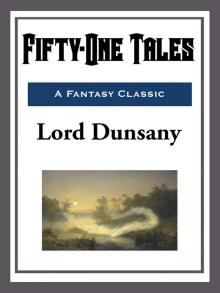 Fifty-One Tales
Fifty-One Tales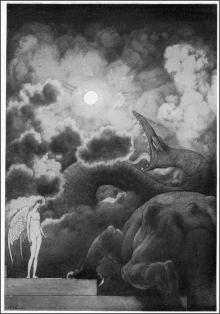 Time and the Gods
Time and the Gods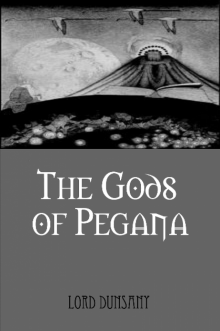 The Gods of Pegana
The Gods of Pegana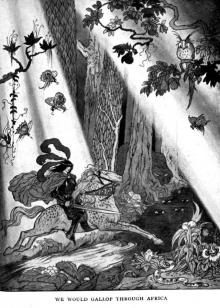 A Dreamer's Tales
A Dreamer's Tales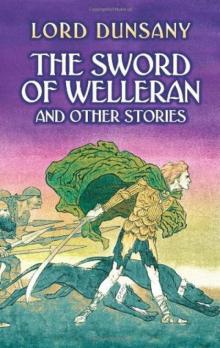 The Sword of Welleran and Other Stories
The Sword of Welleran and Other Stories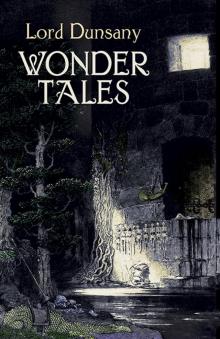 Tales of Wonder
Tales of Wonder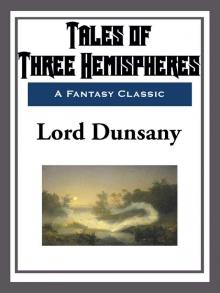 Tales of Three Hemispheres
Tales of Three Hemispheres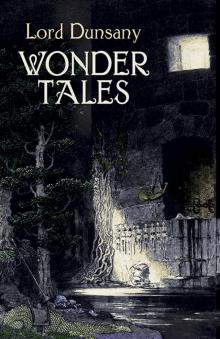 The Book of Wonder
The Book of Wonder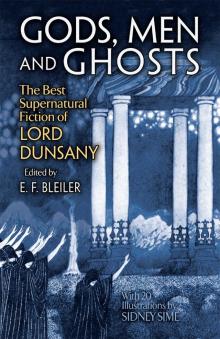 Gods, Men and Ghosts
Gods, Men and Ghosts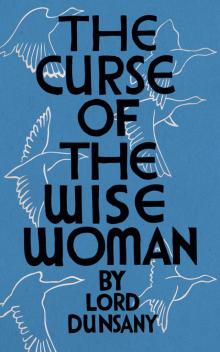 The Curse of the Wise Woman
The Curse of the Wise Woman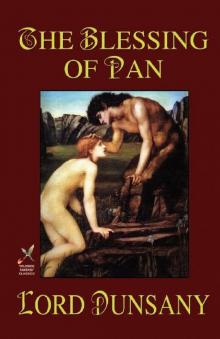 The Blessing of Pan
The Blessing of Pan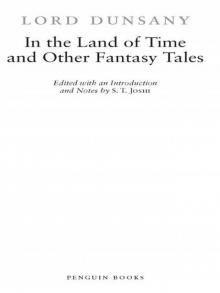 In the Land of Time
In the Land of Time